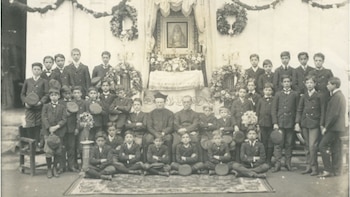BARCELONA - When in the Olympic microcosm one says “Barcelona,” the immediate reaction includes a smile and the evocation of a great Games, surely among the best of all time. But if the question is moved to a wider world, what emerges is not those 1992 Barcelona Games, which in a few months will be 30 years old, but the very bad moment and bleak future of one of the great emblems of the city: Futbol Club Barcelona.
“In free fall. The devastation of Barcelona, naked”, headlined a few days ago “El Periódico”, one of the two main newspapers of the Spanish city, on the front page. The club, with mediocre play and poor results, is in ninth place in the Spanish league.
The “due diligence” to which the club will be subjected will surely reveal new problems, but there is one that is already very clear. Or two, rather: the club owes 1.35 billion euros, and its soccer team, for years its pride and joy, is going through a very bad moment, a depression to which must be added the farewell to the club by the Argentine Lionel Messi.

On August 8, 1992, Barcelona’s Camp Nou stadium was the scene of the Spanish national soccer team’s 3-2 final victory over Poland. And the nearby Palau Blaugrana hosted martial arts events, as well as the roller field hockey tournament, which was an exhibition sport at the Games.
Messi was also an Olympic champion in Beijing 2008. But he is no longer here, he went to Paris - the host city for the 2024 Games in less than three years - and left Barcelona, a city that is one of the clearest examples of positive urban transformation thanks to the Olympic Games, in a depression.
A city that was the birthplace of a transcendental president for the history of Olympism, the Spaniard Juan Antonio Samaranch, at the head of the IOC between 1980 and 2001.
Is it not an exaggeration to say that Barcelona is depressed because Futbol Club Barcelona is going through a very bad moment? No, it is not. The Catalan ruling elites have made Barcelona a banner of their “national” pride, and the slogan “more than a club” suggests that the club serves as a figurehead for higher missions than a soccer match: it is part of the identity of a region of seven million inhabitants that claims to be recognized as a nation.
Independence from Spain is another matter, an issue on which there is no consensus and which divides Catalans into almost exact halves.
If the proud Futbol Club Barcelona is sinking, a good part of the Catalans are sinking as well. Is there a future? Journalist Marc Menchén wrote in “El Periódico” that Barcelona should forget about the pride of being a social club -like Real Madrid- and embrace a more modern scheme, with aspects of a Sociedad Anónima Deportiva (SAD). And he gave the Bundesliga as an example.
“The German model is governed by a very simple rule: everyone in the Bundesliga must be more than 51 percent controlled by the social club from which they emerged (...). Respect for tradition, but adapting its nature to a context in which the big clubs already have an annual turnover of more than 500 million euros and require millionaire investments”.
Menchén delved into the mixed systems of Bayern Munich, Borussia Dortmund and Juventus.
“At Bayern, the social club board is chaired by Herbert Hainer, former CEO of adidas, and has footballers, academics and businessmen alongside him. On the club’s board are top officials from adidas, Audi, Allianz, Unicredit and Deutsche Telekom.”
That “Barcelona” of Freddie Mercury and Montserrat Caballé made the skin of those who lived the Games of the XXV Olympiad between July 25 and August 9, 1992, stand on end. Today the atmosphere is different, and part of the depression nestles in the Camp Nou.
KEEP READING:
Últimas Noticias
Sinner-Alcaraz, the duel that came to succeed the three phenomenons
Beyond the final result, Roland Garros left the feeling that the Italian and the Spaniard will shape the great duel that came to help us through the duel for the end of the Federer-Nadal-Djokovic era.
Table tennis: Brazil’s Bruna Costa Alexandre will be Olympic and Paralympic in Paris 2024
She is the third in her sport and the seventh athlete to achieve it in the same edition; in Santiago 2023 she was the first athlete with disabilities to compete at the Pan American level and won a medal.

Rugby 7s: the best player of 2023 would only play the medal match in Paris
Argentinian Rodrigo Isgró received a five-game suspension for an indiscipline in the circuit’s decisive clash that would exclude him until the final or the bronze match; the Federation will seek to make the appeal successful.

Rhonex Kipruto, owner of the world record for the 10000 meters on the road, was suspended for six years
The Kenyan received the maximum sanction for irregularities in his biological passport and the Court considered that he was part of a system of “deliberate and sophisticated doping” to improve his performance. He will lose his record and the bronze medal at the Doha World Cup.

Katie Ledecky spoke about doping Chinese swimmers: “It’s difficult to go to Paris knowing that we’re going to compete with some of these athletes”
The American, a seven-time Olympic champion, referred to the case of the 23 positive controls before the Tokyo Games that were announced a few weeks ago and shook the swimming world. “I think our faith in some of the systems is at an all-time low,” he said.





